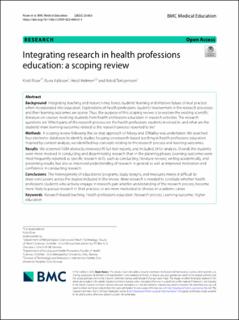| dc.description.abstract | Background Integrating teaching and research may boost students’ learning and improve future clinical practice when incorporated into education. Explorations of health professions students’ involvement in the research processes and their learning outcomes are sparse. Thus, the purpose of this scoping review is to explore the existing scientific literature on courses involving students from health professions education in research activities. The research questions are: Which parts of the research process are the health professions students involved in, and what are the students’ main learning outcomes related to the research process reported to be?
Methods A scoping review following the six-step approach of Arksey and O’Malley was undertaken. We searched four electronic databases to identify studies focusing on research-based teaching in health professions education. Inspired by content analysis, we identified key concepts relating to the research process and learning outcomes.
Results We screened 1084 abstracts, reviewed 95 full-text reports, and included 24 for analysis. Overall, the students were more involved in conducting and disseminating research than in the planning phases. Learning outcomes were most frequently reported as specific research skills, such as conducting literature reviews, writing academically, and presenting results, but also as improved understanding of research in general as well as improved motivation and confidence in conducting research.
Conclusions The heterogeneity of educational programs, study designs, and measures makes it difficult to
draw conclusions across the studies included in the review. More research is needed to conclude whether health professions students who actively engage in research gain a better understanding of the research process, become more likely to pursue research in their practice, or are more motivated to choose an academic career. | en_US |

